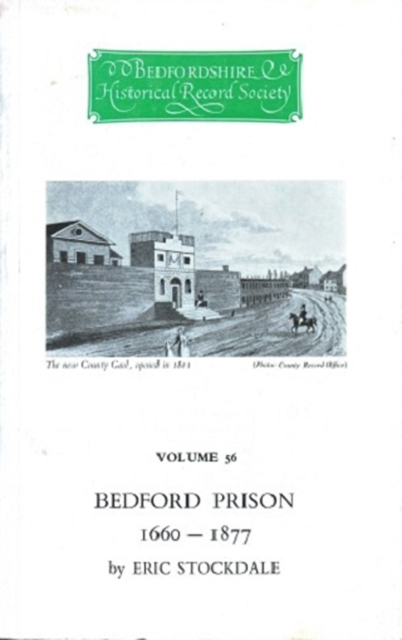Book contents
- Frontmatter
- Contents
- Acknowledgments
- Foreword
- Introduction
- Chapter 1 John Bunyan 1660-1688
- Chapter 2 Some Contemporaries of Bunyan
- Chapter 3 The Richardson-Howard Family of Jailers 1711-1814
- Chapter 4 Transportation to America Before 1776
- Chapter 5 John Howard 1773-1790
- Chapter 6 Samuel Whitbread 1790-1815
- Chapter 7 Philip Hunt 1815-1835
- Chapter 8 Philip Hunt 1815-1835
- Chapter 9 Lord John Russell In Office 1835-1841
- Chapter 10 The Rebuilding of The Jail 1839-1849
- Chapter 11 The Unsettled Years 1849-1853
- Chapter 12 The Final Years Before Nationalisation 1853-1877
- Conclusion
- Note On References and Spelling
- Appendix 1 Bedford in 1765
- Appendix 2 Jailers of Bedford 1710-1885
- Appendix 3 The Richardson-Howard Family
- Appendix 4 Site Plan of Bunyan’s Jail
- Appendix 5 Deed of Appointment of Jailers 1740
- Appendix 6 The Whitbread-Howard Link
- Appendix 7 Lord John Russell’s Family
- Appendix 8 Bedford in 1841
- Appendix 9 The Jail in 1849
- Index of Names
- Subject Index
- Bedfordshire Historical Record Society
- Miscellaneous Endmatter
Chapter 8 - Philip Hunt 1815-1835
Published online by Cambridge University Press: 03 August 2023
- Frontmatter
- Contents
- Acknowledgments
- Foreword
- Introduction
- Chapter 1 John Bunyan 1660-1688
- Chapter 2 Some Contemporaries of Bunyan
- Chapter 3 The Richardson-Howard Family of Jailers 1711-1814
- Chapter 4 Transportation to America Before 1776
- Chapter 5 John Howard 1773-1790
- Chapter 6 Samuel Whitbread 1790-1815
- Chapter 7 Philip Hunt 1815-1835
- Chapter 8 Philip Hunt 1815-1835
- Chapter 9 Lord John Russell In Office 1835-1841
- Chapter 10 The Rebuilding of The Jail 1839-1849
- Chapter 11 The Unsettled Years 1849-1853
- Chapter 12 The Final Years Before Nationalisation 1853-1877
- Conclusion
- Note On References and Spelling
- Appendix 1 Bedford in 1765
- Appendix 2 Jailers of Bedford 1710-1885
- Appendix 3 The Richardson-Howard Family
- Appendix 4 Site Plan of Bunyan’s Jail
- Appendix 5 Deed of Appointment of Jailers 1740
- Appendix 6 The Whitbread-Howard Link
- Appendix 7 Lord John Russell’s Family
- Appendix 8 Bedford in 1841
- Appendix 9 The Jail in 1849
- Index of Names
- Subject Index
- Bedfordshire Historical Record Society
- Miscellaneous Endmatter
Summary
Henry Grey Bennet and Other Reformers
We have already met the Hon. Henry Grey Bennet, M.P., as Whitbread’s friend and as the Whigs’ principal spokesman on prison matters. The first reference to Bennet in Bedfordshire comes from Lord John Russell writing in his diary shortly after his eleventh birthday, on 29 August 1803: ‘I went out hunting today for the first time in my life, with Tavistock’s harriers. Mr. and Mrs. Whitbread and Mr. Bennett (sic) came here today from Southin’.
Twelve years later, on 1 February 1815, Bennet wrote to Whitbread: ‘I shall have my jail fees Bill ready and I hope to have your aid in support of a committee to examine into the state of the prisons within the Metropolis’. The Bill was successful and became the Act which finally abolished what remained of jail fees. The total abolition of jail fees had been advocated in 1808 by Sir Richard Phillips in a letter to Romilly, dated 12 May, copies of which the writer sent to several influential Members of Parliament, including Whitbread. Phillips, a London publisher and journalist, had himself been imprisoned years earlier for selling Tom Paine’s Rights of Man. When appointed a Sheriff of the City of London he followed the example of John Howard, an earlier ex-prisoner who achieved the office of High Sheriff, and inspected London’s prisons, becoming one of their sternest critics. Pursuant to Bennet’s Act the Bedfordshire justices abolished Thomas Warner’s remaining fees in 1815 and ordered, ‘That the yearly sum of £25 be allowed and paid to the jailer in lieu of all fees and gratuities abolished by the said Act, the same to be paid out of the county rates to his salary’.
Bennet also got his Select Committee, which with him as chairman went into far more questions than are suggested by its name, the Select Committee on the State of Police of the Metropolis. Romilly was a member but also gave evidence; so did Capper on the question of the hulks. James Elmes, the architect, was so impressed by their committee’s work that in 1817 he dedicated his pamphlet on prisons to Bennet and his colleagues.
- Type
- Chapter
- Information
- Bedford Prison 1660-1877 , pp. 122 - 139Publisher: Boydell & BrewerFirst published in: 2023

